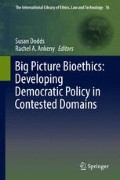Abstract
Public engagement in policy making is on mechanism used in an effort to improve the legitimacy of policy decisions surrounding ethically contentious health policy or medical technologies. Citizens’ trust in the process and in the medical, science and democratic institutions surrounding the policy is vital to the success of efforts to engage publics in deliberative processes. This paper explores the nature and role of trust in deliberative democracy, as well as effects of misplaced and abused trust on the legitimacy of specific policies and the overall project of inclusive participation of citizens in public policy deliberation.
Access this chapter
Tax calculation will be finalised at checkout
Purchases are for personal use only
References
Anderson, J., and A. Honneth. 2005. Autonomy, vulnerability, recognition and justice. In Autonomy and the challenges to liberalism, ed. J. Christman and A. Anderson, 127–149. Cambridge: Cambridge University Press.
Baier, A. 1994. Trust and its vulnerabilities. In Moral prejudices: Essays on ethics, ed. A. Baier, 130–151. Cambridge: Cambridge University Press.
Bohman, J. 1999. Democracy as inquiry, inquiry as democratic: Pragmatism, social science and the cognitive division of labor. American Journal of Political Science 44(2): 590–607.
Chambers, S. 2003. Deliberative democratic theory. Annual Review of Political Science 6: 307–326.
Dagger, R. 1997. Civic virtues: Rights, citizenship and republican liberalism. New York: Oxford University Press.
Delli Carpini, M.X., F.L. Cook, and L.R. Jacobs. 2004. Public deliberation, discursive participation, and citizen engagement: A review of the empirical literature. American Review of Political Science 7: 315–344.
Dryzek, J.S. 2000. Deliberative democracy and beyond: Liberals, critics, contestations. New York: Oxford University Press.
Elster, J. 1998. Introduction. In Deliberative democracy, ed. J. Elster, 1–18. Cambridge: Cambridge University Press.
Estlund, D.M. 2008. Democratic authority: A philosophical framework. Princeton/Oxford: Princeton University Press.
Festenstein, M. 2005. Dewey’s political philosophy. In The Stanford encyclopedia of philosophy, Spring 2009 ed, ed. Edward N. Zalta. http://plato.stanford.edu/archives/spr2009/entries/dewey-political/.
Fishkin, J.S. 1995. The voice of the people: Public opinion and democracy. New Haven/London: Yale University Press.
Gastil, J. 2000. By popular demand: Revitalizing representative democracy through deliberative elections. Berkeley: University of California Press.
Gaus, G.F. 1996. Justificatory liberalism: An essay on epistemology and political theory. New York: Oxford University Press.
Goodin, R.E. 2003. Reflective democracy. New York: Oxford University Press.
Govier, T. 1997. Social trust and human communities. Montreal/Kingston: McGill-Queen’s University Press.
Gutmann, A., and D. Thompson. 1996. Democracy and disagreement. Cambridge, MA: Harvard University Press.
Gutmann, A., and D. Thompson. 2003. Deliberative democracy beyond process. In Debating deliberative democracy, ed. J.S. Fishkin and P. Laslett, 31–53. Oxford: Blackwell Publishers.
Habermas, J. 1996. Three normative models of democracy. In Democracy and difference: Contesting the boundaries of the political, ed. S. Benhabib, 21–30. Princeton: Princeton University Press.
Hardin, R. 1999. Do we want trust in government? In Democracy and trust, ed. M. Warren, 22–41. Cambridge: Cambridge University Press.
Hookway, C. 2008. Pragmatism. In The Stanford encyclopedia of philosophy,Spring 2010 ed, ed. Edward N. Zalta. http://plato.stanford.edu/archives/spr2010/entries/pragmatism/ .
Irwin, A. 1995. Citizen science: A study of people, expertise and sustainable development. New York: Routledge.
Irwin, A. 2006. The politics of talk: Coming to terms with the ‘New’ scientific governance. Social Studies of Science 36: 299–320.
Irwin, A., and B. Wynne (eds.). 1996. Misunderstanding science? The public reconstruction of science and technology. Cambridge/New York: Cambridge University Press.
Jasanoff, S. 2005. Designs on nature: Science and democracy in Europe and the United States. Princeton: Princeton University Press.
Jones, K. 1996. Trust as an affective attitude. Ethics 107: 4–25.
Macleod, C. 2006. Trust. In The Stanford encyclopedia of philosophy,Spring 2011 ed, ed. Edward N. Zalta.http://plato.stanford.edu/archives/spr2011/entries/trust/ .
McGeer, V. 2008. Trust, hope and empowerment. Australasian Journal of Philosophy 86(2): 237–254.
Warren, M. 1999. Democratic theory and trust. In Democracy and trust, ed. M. Warren, 310–345. Cambridge: Cambridge University Press.
Wynne, B. 2006. Public engagement as a means of restoring public trust in science—Hitting the notes, but missing the music? Community Genetics 9: 211–220.
Young, I.M. 2000. Inclusion and democracy. New York: Oxford University Press.
Acknowledgments
This research was supported by the Australian Research Council Discovery Grant “Big Picture Bioethics: Policy-Making and Liberal Democracy” (DP0556068), the ARC Centre of Excellence for Materials Science (CE0561616), and the University of Tasmania. It is a revised version of a chapter entitled “Trust accountability and participation: conditions and constraints on ‘new’ democratic models” published in Public Engagement and Emerging Technologies, ed. Edna Einsiedel and Kieran O’Doherty: UBC Press, 2013, 69–79, Vancouver. Reprinted with the permission of UBC Press.
Author information
Authors and Affiliations
Corresponding author
Editor information
Editors and Affiliations
Rights and permissions
Copyright information
© 2016 Springer International Publishing Switzerland
About this chapter
Cite this chapter
Dodds, S. (2016). Participation and Trust: Conditions and Constraints on Democratic Deliberation. In: Dodds, S., Ankeny, R. (eds) Big Picture Bioethics: Developing Democratic Policy in Contested Domains. The International Library of Ethics, Law and Technology, vol 16. Springer, Cham. https://doi.org/10.1007/978-3-319-32240-7_3
Download citation
DOI: https://doi.org/10.1007/978-3-319-32240-7_3
Published:
Publisher Name: Springer, Cham
Print ISBN: 978-3-319-32239-1
Online ISBN: 978-3-319-32240-7
eBook Packages: Religion and PhilosophyPhilosophy and Religion (R0)

